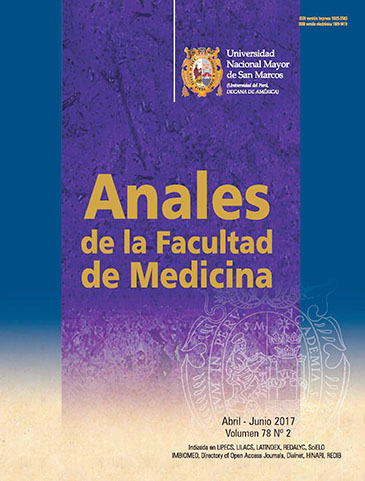Incompatible ABO blood group renal transplant. Unprecedented collaborative experience between Spain and Peru
DOI:
https://doi.org/10.15381/anales.v78i2.13222Keywords:
ABO Incompatibility, Kidney Transplantation, Accommodation, HLA antibodies, Immunological Risk.Abstract
ABO blood group incompatibility and HLA sensitization are major barriers that need to be overcome in order to make optimum use of kidneys from living donors possible. We report the first successful ABOincompatible kidney transplant in a 24-year old, highly sensitized (panel reactive antibodies (PRA) 89% kidney retransplantation patient, who lacked any option to get a cadaveric or family donor. However, the patient’s sole HLA-compatible living donor had group A blood incompatible with the recipient’s O blood group. The patient required a pre-conditioning regime that consisted of plasma exchange, rituximab, immunoglobulin, and quadruple immunosuppressive therapy in order to reduce high titers of anti-A isoagglutinins from 1:128 to a safe level of 1:8, for successful transplant. This was performed in coordination with the Renal Transplant Unit of Hospital Clinic de Barcelona (HCB), Spain. Absence of rejection mediated by isoagglutinins shows the potential benefit of a protocol consisting in removing antibodies from the anti-blood group. Two years after transplantation, the kidney function remains stable, with creatinine levels of 1.5 mg%. We conclude that an ABO-incompatible kidney transplant is a viable option for patients whose only donor has blood of an incompatible blood group and for us this represents a hope-inspiring source of organs.Downloads
Published
2017-07-17
Issue
Section
Casos clínicos
License
Copyright (c) 2017 Pedro Méndez Chacón

This work is licensed under a Creative Commons Attribution-NonCommercial-ShareAlike 4.0 International License.
Those authors who have publications with this magazine accept the following terms:
- Authors will retain their copyrights and guarantee the journal the right of first publication of their work, which will be simultaneously subject to Creative Commons Attribution License that allows third parties to share the work as long as its author and its first publication this magazine are indicated.
- Authors may adopt other non-exclusive licensing agreements for the distribution of the version of the published work (eg, deposit it in an institutional electronic file or publish it in a monographic volume) provided that the initial publication in this magazine is indicated.
- Authors are allowed and recommended to disseminate their work over the Internet (eg: in institutional telematic archives or on their website) before and during the submission process, which It can produce interesting exchanges and increase quotes from the published work. (See El efecto del acceso abierto ).
How to Cite
1.
Méndez Chacón P, Bardales F, Chunga A, Méndez Chacón C, Vidalón Fernández A, Diekmann F, et al. Incompatible ABO blood group renal transplant. Unprecedented collaborative experience between Spain and Peru. An Fac med [Internet]. 2017 Jul. 17 [cited 2025 Jun. 19];78(2):224-9. Available from: https://revistasinvestigacion.unmsm.edu.pe/index.php/anales/article/view/13222



